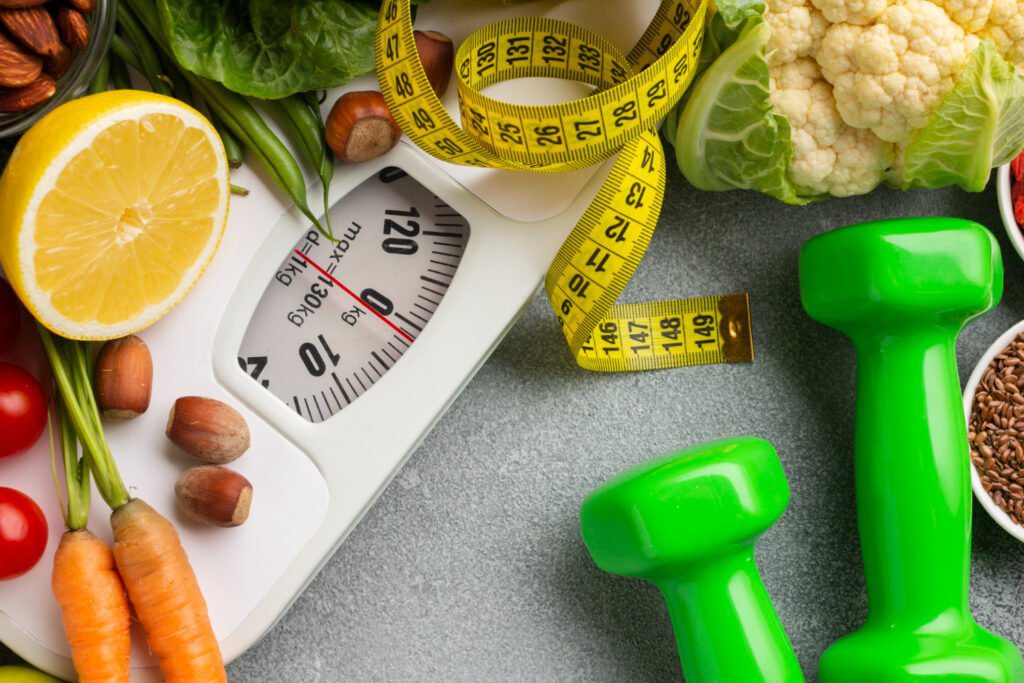When it comes to losing weight, the concern of most is trying to select the most effective diet. Without a doubt, some diets are more recommended than others, but in the long term the results depend more on habits than on specific diets.
If you see change as something temporary, you will surely fail. When you return to your usual habits, the usual kilos will return, plus some as a gift.
You must, of course, choose a good eating plan, but then focus on the new habits to develop. In this article you will learn about the habits that are usually associated with long-term success, and concrete ideas to incorporate them.
Seven Habits to Lose Weight with Any Diet.
1. Allow some flexibility (Flexible Control).
Very restrictive diets are difficult to maintain over time. Eliminating foods you enjoy forever reduces adherence by requiring too much willpower. Plus, we want more of what we can’t have, and this rigid control raises the risk of cravings and possibly binge eating.(1)
On the other hand, excessive flexibility is also negative. To achieve certain goals you must make certain sacrifices, and that means setting limits for yourself.
That ideal balance point is what some studies call “flexible control” , which will vary depending on each person.(2)
Maintaining flexible control involves paying attention to food and following certain guiding rules , but understanding that your progress does not stop just because you have your favorite pizza for dinner one day. It’s about prioritizing real food and being aware of portions, without punishing yourself or blaming yourself if one day you eat more than you should or something not recommended.
While this flexible control makes it easier to maintain lost weight, rigid control is associated with worse long-term outcomes.(3)
Furthermore, rigid control can lead to a dangerous obsession with achieving supposed dietary purity . When you fail in this impossible mission, you collapse, making the results worse.
Avoid the all or nothing mentality. Seek progress, not perfection.
2. Reduce snacks.
The belief that we should eat five or six times a day is recent. In the 1970s, most people ate three large meals a day, but this number increased over time.
On the one hand, nutritional recommendations leaned towards small meals, thinking that in this way hunger would be better controlled and metabolism would be kept high (both ideas are wrong). On the other hand, the food industry increased its promotion of mid-morning and mid-afternoon snacks. They knew that if we increase the number of daily intakes we will tend to eat more, and large stomachs are more profitable than small ones . In this way, the average number of meals increased, from the typical three meals a day just a few decades ago to five or six today.(4)
Calories from snacks have increased in all age ranges, contributing to the current caloric excess.
In general, more snacks are associated with higher caloric intake and more overweight. Most of the time we don’t even eat these snacks out of hunger, but out of gluttony, boredom or stress.
Evidently eating a fruit is not the same as eating a chocolate bar, but snacks are where we tend to put more garbage . As a general rule, try to eat the fewest meals that make you feel full, reducing snacks between meals.

3. Cook more and eat out less.
Cooking is one of the best skills you can develop. It’s not about making sophisticated dishes, but about defending yourself with the basics . In the time that Master Chef lasts you can prepare food for several days. You will also avoid exposing yourself to their misleading propaganda .
Cooking more at home and eating less in restaurants are habits that are associated with less weight gain.
When cooking you have much more control over your meals , both their size and their ingredients. You will surely use better oils and less caloric sauces.
If you eat out frequently, try to respect some rules:
- Tell them not to put bread or snacks on the table.
- If you order salad, serve the sauce separately, or simply add oil and vinegar.
- Ask them to change undesirable accompaniments (such as French fries) for some salad.
- You don’t have to eat everything they put on your plate. Eating more than you need is also wasting food , and you will carry the excess with you in the form of fat. Additionally, in most restaurants you can take leftovers with you.
- Skip dessert, or just order some fruit.
4. Reconnect with the body’s signals.
If you’ve followed a strict diet, for example a ketogenic or PSMF approach , you’ve probably had to count calories and macronutrients. This has benefits and I recommend doing it for a while , but if you do it constantly you increase the risk of disconnecting from your body.
Once you are at your ideal weight, you must learn to reconnect with your body’s internal signals , stopping eating when you are satisfied, without becoming full. This is precisely what the ancient Japanese technique of Hara hachi bu , or 80% belly, recommends.
The goal is for your body, and not your phone, to tell you when to stop eating . To achieve this, you must be more conscious when eating, and it is precisely the following recommendation.
5. Be more conscious when eating.
We make more than 200 decisions about food a day , most of them unconscious. If you don’t reflect on what you eat or control portions, you will be at the mercy of your impulses, and you will be easily manipulated by commercial interests.
In fact, this awareness process must begin long before sitting at the table . When you go shopping, take a list. Don’t buy anything that isn’t on the list if you don’t need it, even if it’s on sale. Reject free samples.
At mealtime, chew calmly and pay attention, avoiding eating in front of the television or in the presence of any other distraction. Eat the assigned portion and do not repeat, unless you are really hungry.
Don’t eat directly from the refrigerator or packaging. Take out the portion, serve it on a plate and save the rest.
In short, it’s about making yourself more aware of the decisions you make around food, and that greater awareness will improve your behavior.
Remind yourself frequently why you do this. Aligning your behavior with your values improves your ability to self-regulate, tolerate uncomfortable sensations, and be more aware of your decisions.
6. Weigh yourself frequently.
I know this recommendation is not very popular, but the evidence is clear. People who weigh themselves frequently lose more weight and gain it back less.
Some believe that weighing yourself can cause anxiety, but the evidence does not seem to support this idea. And if this happened, the fault would not be the scale, but our relationship with weight.
To begin with, you must understand that weight fluctuations are normal, and that your progress is measured by many other variables (measurements, muscle, performance, energy level). Furthermore, if you gain two kilos of muscle and lose two kilos of fat, your body will look much better, even though your weight has not changed.
But all this does not mean that you should ignore weight, but rather understand it and put it in context . And above all, you should avoid linking your personal worth to the value indicated on the scale. If you allow your weight to define you, stopping weighing yourself doesn’t solve the problem.
Another benefit of weighing yourself frequently is that you see the trend more clearly, preventing specific fluctuations from making you make wrong decisions. Don’t obsess over weight, but don’t ignore it either .
7. Include physical activity.
Increasing physical activity and, especially strength training, will not only enhance the results of the diet, but is one of the habits most strongly associated with long-term weight maintenance.
Exercise benefits us through multiple mechanisms:
- Helps regulate appetite.
- Improves insulin sensitivity.
- Raises metabolism, especially strength training.
- Increases energy expenditure.
- Improves our mood.
Bottom Line.
Habits create order in your life and combat entropy. People who maintain long-term weight loss are more similar in their habits than in their diets . If you want to be successful in the long term, think less about diets and more about habits.
+4 Sources
FitMeMore has strict sourcing guidelines and relies on peer-reviewed studies, educational research institutes, and medical organizations. We avoid using tertiary references. You can learn more about how we ensure our content is accurate and up-to-date by reading our editorial policy.
- Food cravings mediate the relationship between rigid, but not flexible control of eating behavior and dieting success; https://pubmed.ncbi.nlm.nih.gov/21824503/
- Behavioural correlates of successful weight reduction over 3 y. Results from the Lean Habits Study; https://www.nature.com/articles/0802530
- Rigid and flexible control of eating behavior in a college population; https://pubmed.ncbi.nlm.nih.gov/15598598/
- Does hunger and satiety drive eating anymore? Increasing occasions and decreasing time between eating occasions in the United States; https://www.researchgate.net/publication/42255196_Does_hunger_and_satiety_drive_eating_anymore_Increasing_occasions_and_decreasing_time_between_eating_occasions_in_the_United_States
How we reviewed this article:
Our team of experts is always monitoring the health and wellness field, ensuring that our articles are updated promptly as new information emerges. See Our Editorial Process
May 13, 2025
Written By: Rosanne Rust
Reviewed By: Kim Ross
Written By: Rosanne Rust
Reviewed By: Kim Ross

 Workout
Workout
 Meditation
Meditation





 Contact Us
Contact Us










